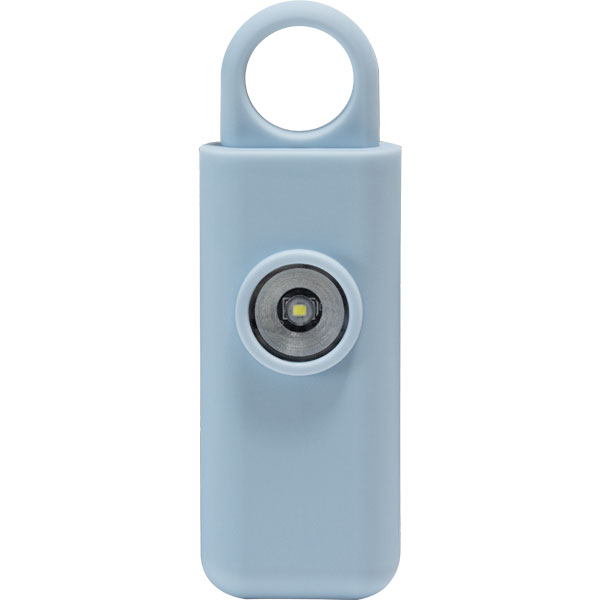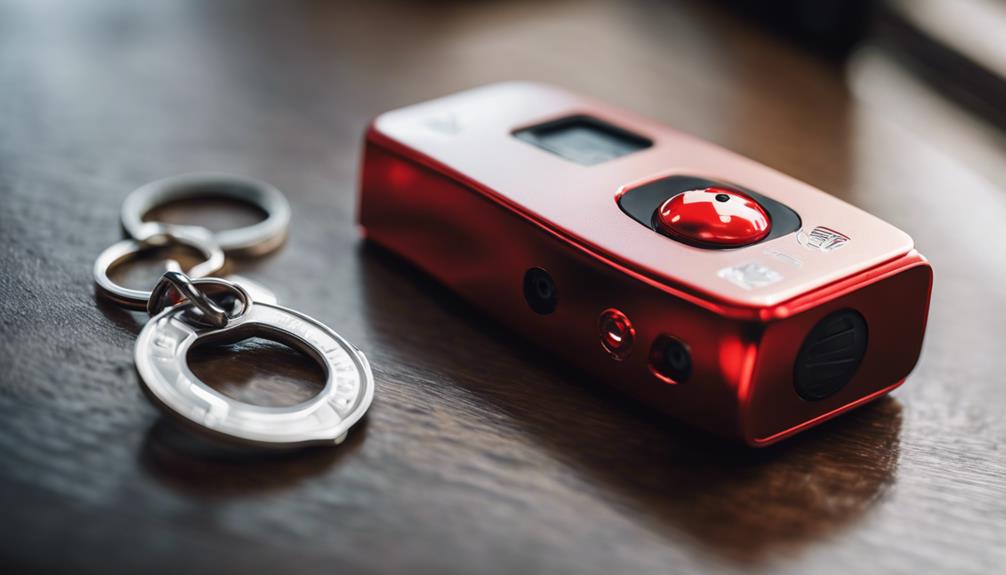
Brainstorm Security Shop

For Orders Over $199

On Any Of Our Products

Details On Refund Page
As a night runner, you’re likely aware of the heightened risks that come with hitting the pavement under the cover of darkness. You’ve probably considered various safety measures, but have you ever thought about the effectiveness of a personal alarm? These devices are designed to be your first line of defense, emitting a loud sound that can deter potential attackers and alert passersby. Selecting the right model could be crucial; it’s not just about volume but also ease of use and reliability. Let’s explore what features you should look for and why this small device might be one of the most important pieces of gear in your nightly running kit. What happens, though, when a situation escalates despite your precautions?
Personal alarms significantly boost your safety by deterring potential attackers and alerting nearby help. When you’re running alone at night, the heightened risk makes a personal alarm a crucial addition to your gear. It’s not just about feeling secure, but actually being prepared for unpredictable situations.
Imagine you’re jogging through a dimly lit park and you sense something off. With a personal alarm, you’re just a quick press away from emitting a loud sound that can scare off someone with bad intentions. This noise isn’t just a deterrent; it also makes others aware of your location and your distress, significantly increasing the chances that someone will come to your aid or call for further help.
Moreover, the presence of an alarm itself can make you more confident and less of a target. Attackers often look for easy, vulnerable targets. If you seem prepared and alert, you’re less likely to be chosen as a potential victim. This mental comfort allows you to focus more on your exercise and enjoy your run, knowing you’ve taken a proactive step towards your own safety.

When selecting a personal alarm for your night runs, it’s essential to consider several key factors. First, think about the alarm’s volume. You’ll want something that’s loud enough to deter an attacker and attract attention, typically around 120 decibels or more. Also, the sound should be piercing, so it can be heard over long distances or through barriers.
Next, consider the alarm’s ease of use. In a panic situation, you can’t afford to fumble around. Look for an alarm that activates quickly and easily, ideally with the push of a button or a simple pull mechanism. It’s also smart to choose one that you can operate comfortably with gloves on, especially in colder weather.
Durability is another crucial aspect. Your alarm should withstand the elements, particularly if you’re running in rain or snow. Waterproof or at least water-resistant options are preferable. Additionally, the design should be compact and lightweight, so it doesn’t hinder your run.
Lastly, check the attachment options. A good personal alarm should easily attach to your clothing, running belt, or armband. This way, it remains accessible and won’t get lost or dropped during your run. Choose one that feels secure and stable, so it stays put no matter how fast you move.
Now that you’ve selected a suitable personal alarm, understanding how to use it effectively can greatly enhance your safety during night runs. It’s not just about having it; it’s about knowing when and how to activate it to deter threats and alert others to your need for help.
Firstly, familiarize yourself with the alarm’s operation before you head out. Test it at home to ensure it’s working correctly and you’re comfortable using it. You’ll want to be able to activate it quickly and without hesitation if the need arises.
Always keep your alarm within easy reach. Whether it’s attached to your running belt, wristband, or held in your hand, you shouldn’t have to fumble around to access it. Time is critical in an emergency.
Consider the volume of your personal alarm. It should be loud enough to startle an attacker and attract attention from others nearby. Most alarms range from 120 to 130 decibels, which can be heard from a considerable distance.
Lastly, practice scenarios in your mind. Think about what you’d do in different threatening situations. Being mentally prepared helps you react swiftly and effectively, maximizing your alarm’s potential to keep you safe.

Before you start using your personal alarm during night runs, it’s crucial to understand the legal implications in your area. Each region may have different laws regarding the permissible sound level of personal safety devices and when it’s legal to use them. You’ll need to check whether there are specific noise ordinances that could affect the use of your personal alarm, especially during nighttime hours when noise regulations are often stricter.
Additionally, it’s important to know how your local laws define self-defense and the use of devices like personal alarms under those circumstances. While a personal alarm is generally legal due to its non-violent nature, inappropriate or negligent use could potentially lead to legal issues. For example, intentionally using it to cause disruption or panic in non-threatening situations mightn’t only be frowned upon but could also be illegal.
Make sure you’re also familiar with any regulations regarding the transportation and possession of personal alarms in public places and on public transportation. Some areas might require the device to be kept in a particular manner or restrict its use in specific public settings.
Understanding these legalities ensures that your use of a personal alarm aligns with local laws and helps avoid unexpected legal complications.
Beyond legal considerations, you should also adopt practical safety habits when using your personal alarm during night runs. Always ensure your device is fully charged before you head out. It’s frustrating to reach for your alarm only to find it’s out of power when you need it most.
You’ll also want to wear reflective clothing. This makes you visible to drivers and can be a deterrent to potential attackers, as they’re more likely to target someone who’s less noticeable. It’s a simple step that enhances your visibility and safety.
Vary your routes. If you’re predictable, it’s easier for someone with bad intentions to plan something. By changing your course regularly, you keep potential threats guessing.
Keep your phone charged and within easy reach, not just for emergencies, but to use GPS tracking apps that can alert your loved ones of your whereabouts in real-time.
Lastly, trust your instincts. If something feels off, it probably is. Don’t hesitate to cut your run short or change your route if you’re feeling uneasy. Remember, your safety is more important than sticking to a training schedule or completing a run.

As you lace up for your night runs, remember that a personal alarm can be a game-changer. Opt for one that’s lightweight, loud, and simple to use.
Always test your alarm regularly and familiarize yourself with its features. While staying within legal boundaries, use it confidently if you ever feel threatened.
Combine this tool with other safety practices like running in well-lit areas and staying alert.
Stay safe, run strong, and let your personal alarm be your nighttime ally.

Brainstorm Security Shop
1867 Caravan Trail
Ste 105
Jacksonville, FL 32216
Call us toll free: (800) 859-5566